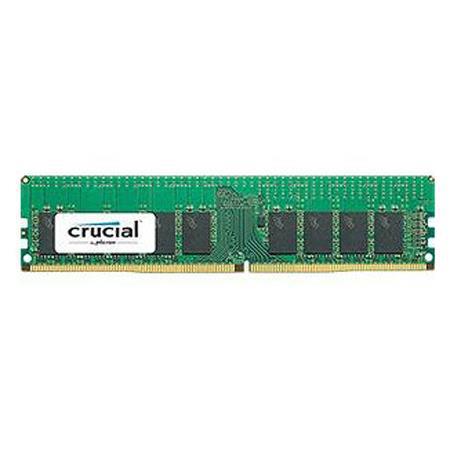


Review Summary
2017-02-22T03:03:42
Great RAM for a budget, affordable and does it's job. Recommended for those looking to save a bit of money when buying parts.
Susanne O.
2017-02-01T12:57:35
Everything worked as expected. This was first time I've ever built a PC and I think I'll stick to using this RAM in the future.
Michael W.
2016-08-19T14:53:17
It's a cheap ram stick that does what I want it to do. No complaints for my gaming build.
Nathan V.
2016-04-20T09:29:32
It's ram, that's all it is, it worked when I got it, hasn't stopped working yet. It doesn't cook me breakfast, do my laundry, or rub my back, but it let's my computer do what it does.
Jeremiah G.
RDIMM
4GB
ECC
DDR4 PC4-19200
2400 MT/S
1.2V
17
1x 4GB
288-Pin
Registered
x8 based
512Meg x 72
Single
649528772756
It's ram.
By Jeremiah G.
It's ram, that's all it is, it worked when I got it, hasn't stopped working yet. It doesn't cook me breakfast, do my laundry, or rub my back, but it let's my computer do what it does.
Solid RAM for and excellent price
By Susanne O.
Great RAM for a budget, affordable and does it's job. Recommended for those looking to save a bit of money when buying parts.
More speed. More bandwidth. More efficient. Next generation DDR4 memory is here
Overcome one of your greatest server limitations: memory. From networking, cloud computing and virtualization to HPC, Big Data and more, memory-dependent server applications require increasingly higher densities of memory and higher levels of performance than are attainable on current DDR3 technology. Enter Crucial DDR4 server memory.
2x the speed
Process data faster. Enable up to twice the responsiveness and increase memory bandwidth by up to 50% to 25.6 GB/s. With Crucial DDR4 memory, introductory data rates start at 2133 MT/s and get even faster as the technology matures, compared to introductory DDR3 rates of 1066 MT/s. Crucial DDR4 memory also delivers faster burst access speeds for improved sequential data throughput by utilizing 4-bank groups that are unique to DDR4 technology.
2x the capacity
Maximize system performance by doubling memory capacity. As DDR4 memory technology matures, it will allow you to double your server's memory capacity and get more out of every module - and your entire network. Built using smaller die that allow more gigabits per component, Crucial DDR4 memory is designed to utilize higher density components, allowing them to deliver DDR4 modules that are up to twice as dense.
Up to 40% more energy efficient
Reduce power and cooling expenses. Crucial DDR4 memory uses 20% less voltage than DDR3 technology and operates at just 1.2V compared to 1.5V for standard DDR3 server memory. Combined with the additional power-saving features inherent in DDR4 memory architecture, Crucial DDR4 memory is able to deliver up to 40% power savings compared to standard DDR3 technology. Also, since less heat is generated per module, it's easier to keep systems cool.
Enhance cloud computing, Big Data, HPC and more
For memory-dependent server applications such as virtualization, cloud computing, Big Data and HPC, Crucial DDR4 server memory is an ideal way to increase memory bandwidth and capacity, while also reducing power expenses. Since memory often functions as a fixed (non-shared) component, it's one of the biggest performance constraints for data centers. Maximize DDR4 memory capacity and achieve next generation performance and efficiency. Crucial DDR4 memory is compatible with future Intel Xeon processor E3-1200 v3 and E5-2600 v3 product families, allowing you to handle diverse enterprise workloads with ease.
Micron quality - A higher level of reliability
As a brand of Micron, one of the largest memory manufacturers in the world, Crucial DDR4 memory represents the future of server capability. From the original DDR technology to DDR4, they have engineered the memory technologies that have powered the world's servers for 35 years and counting. Designed for leading platforms, compatible with OEM systems and warranties and backed by a limited lifetime warranty, Crucial DDR4 memory pushes the limits on server performance.
Memory spec terms
If you're not sure if a module is right for your system, use the Crucial Memory Advisor tool for a list of guaranteed compatible modules.
NON-ECC/Non-parity
Most desktop and laptop computers take NON-ECC or Non-parity memory.
ECC/Parity
ECC or parity modules look for errors in data and are most often found in servers and other mission-critical applications used by large networks and businesses.
Unbuffered
Most PCs and workstations use unbuffered memory which is faster than registered memory.
Registered/Buffered
Registered or buffered modules delay all information transferred to the module by one clock cycle. This type of memory is primarily used in servers.
Fully buffered
Designed for next-generation servers, features an advanced memory buffer.
CL
CAS (column address strobe) latency, which is the number of clock cycles it takes before data starts to flow after a command is received. Lower CL is faster. Modules with different CL can be mixed on a system, but the system will only run at the highest (slowest) CL.
Component configuration
(For example: 64Meg x 64) Indicates the size of the memory chip components on the module.
Voltage
For example 2.6V. Indicates the power used by the module. The lower the better.